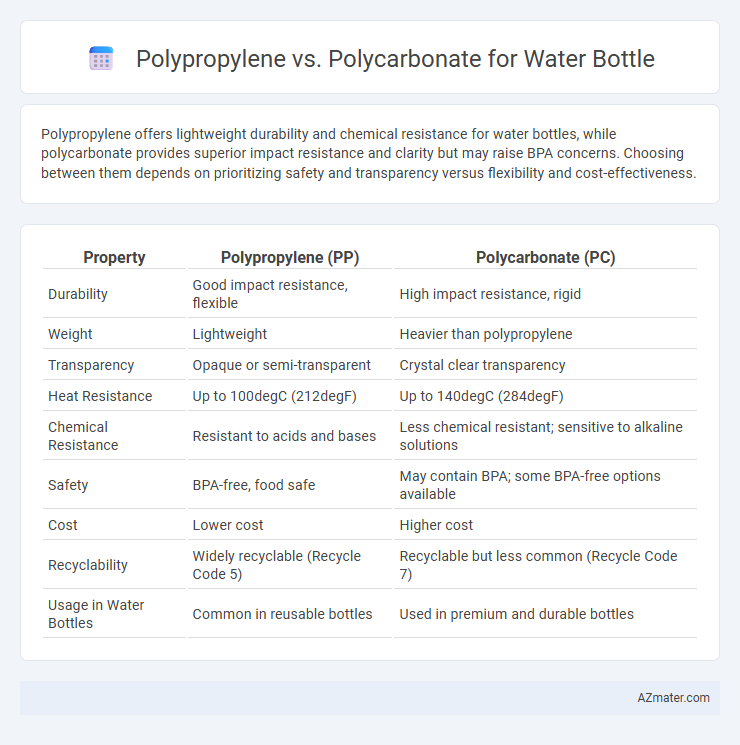Polypropylene offers lightweight durability and chemical resistance for water bottles, while polycarbonate provides superior impact resistance and clarity but may raise BPA concerns. Choosing between them depends on prioritizing safety and transparency versus flexibility and cost-effectiveness.
Table of Comparison
| Property | Polypropylene (PP) | Polycarbonate (PC) |
|---|---|---|
| Durability | Good impact resistance, flexible | High impact resistance, rigid |
| Weight | Lightweight | Heavier than polypropylene |
| Transparency | Opaque or semi-transparent | Crystal clear transparency |
| Heat Resistance | Up to 100degC (212degF) | Up to 140degC (284degF) |
| Chemical Resistance | Resistant to acids and bases | Less chemical resistant; sensitive to alkaline solutions |
| Safety | BPA-free, food safe | May contain BPA; some BPA-free options available |
| Cost | Lower cost | Higher cost |
| Recyclability | Widely recyclable (Recycle Code 5) | Recyclable but less common (Recycle Code 7) |
| Usage in Water Bottles | Common in reusable bottles | Used in premium and durable bottles |
Introduction to Water Bottle Materials
Polypropylene and polycarbonate are two common materials used in water bottle manufacturing, each offering distinct properties that influence durability, safety, and usability. Polypropylene is a lightweight, BPA-free plastic known for its resistance to chemical leaching and heat, making it suitable for reusable, eco-friendly bottles. Polycarbonate provides exceptional impact resistance and clarity but has raised concerns due to BPA content, prompting scrutiny and gradual replacement by BPA-free alternatives in water bottle production.
What is Polypropylene?
Polypropylene is a lightweight, durable thermoplastic polymer commonly used in water bottles due to its high resistance to chemical leaching and excellent impact strength. It offers superior moisture resistance and is BPA-free, making it safe for food and beverage storage. This material also withstands high temperatures, allowing for easy cleaning and repeated use without degrading.
What is Polycarbonate?
Polycarbonate is a durable, transparent thermoplastic known for its high impact resistance and clarity, making it a popular choice for water bottles that require strength and shatterproof qualities. Unlike polypropylene, polycarbonate can withstand higher temperatures without deforming, ensuring safety for hot liquids and frequent dishwasher use. Its ability to maintain structural integrity and resist cracking under pressure makes it ideal for reusable water bottles that need long-lasting performance.
Durability Comparison: Polypropylene vs Polycarbonate
Polycarbonate offers superior impact resistance and toughness compared to polypropylene, making it more durable for repeated drops and rough handling in water bottles. Polypropylene is less brittle and provides good chemical resistance, but it tends to degrade faster under UV exposure and high temperatures. For long-term durability, polycarbonate water bottles maintain structural integrity and clarity better than polypropylene options.
Safety and Health Impacts
Polypropylene water bottles are BPA-free and resistant to chemical leaching, making them a safer choice for everyday use, especially when exposed to heat or sunlight. Polycarbonate bottles, often containing BPA, pose potential health risks due to the chemical's ability to disrupt endocrine functions. Choosing polypropylene reduces exposure to harmful chemicals and supports safer hydration practices.
Environmental Considerations
Polypropylene water bottles offer better recyclability with a lower environmental footprint due to their biodegradable properties and energy-efficient production process. Polycarbonate, while durable and impact-resistant, raises environmental concerns because it involves bisphenol A (BPA) in manufacturing, which can leach harmful chemicals and complicate recycling. Choosing polypropylene reduces plastic pollution and supports sustainable water bottle usage by promoting easier recycling and minimizing toxic waste.
Weight and Portability
Polypropylene water bottles are significantly lighter than polycarbonate ones, making them ideal for portability and everyday carry. Polycarbonate bottles, while more durable, tend to be heavier, which can add extra weight to backpacks or gym bags. The lightweight nature of polypropylene enhances convenience for outdoor activities and travel without compromising basic strength.
Cost Differences
Polypropylene water bottles typically cost significantly less than polycarbonate bottles due to the lower price of raw materials and simpler manufacturing processes. Polycarbonate offers higher durability and clarity but comes at a premium price, often doubling or tripling the cost of polypropylene alternatives. Cost-sensitive buyers prioritize polypropylene for affordability, while polycarbonate is chosen for performance despite its higher price point.
Best Uses for Each Material
Polypropylene is ideal for water bottles requiring lightweight, flexible, and chemical-resistant properties, making it perfect for sports and outdoor activities due to its durability and resistance to fatigue. Polycarbonate offers superior impact resistance and clarity, making it suitable for reusable water bottles where transparency and toughness are critical, often favored for everyday hydration and child-safe containers. Both materials provide BPA-free options, but polypropylene excels in microwave safety while polycarbonate is better for high-impact durability and scratch resistance.
Which Water Bottle Material Should You Choose?
Polypropylene water bottles offer excellent chemical resistance, lightweight durability, and affordability, making them ideal for everyday use and casual hydration needs. Polycarbonate bottles provide superior impact resistance and clarity, suitable for high-performance or outdoor activities but may raise concerns due to potential BPA content. Choosing between polypropylene and polycarbonate depends on priorities like safety, durability, and intended use; polypropylene is generally safer and more eco-friendly for regular hydration, while polycarbonate excels in strength and heat resistance.

Infographic: Polypropylene vs Polycarbonate for Water Bottle
 azmater.com
azmater.com